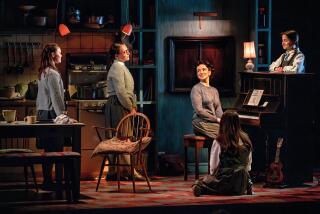Review: Laurie Metcalf in ‘Doll’s House, Part 2’: An acting marvel in one of the year’s best plays
Reporting from NEW YORK — “A Doll’s House, Part 2,” which is receiving its world premiere at South Coast Repertory, had its Broadway opening on Thursday at the Golden Theatre in a separate production confirming that Lucas Hnath has written one of the year’s best plays.
Sam Gold’s production resembles in its tasteful austerity Shelley Butler’s slightly more posh West Coast staging. There’s the same looming door that Nora slammed at the end of Ibsen’s “A Doll’s House,” leaving behind her husband and three small children. There’s the same vacated sitting room, equipped with just a few elegant chairs that can be shuffled around in the unlikely event anyone pays a social call to what looks like a domestic crime scene of a very cold case.
The surface of the New York production may be strikingly similar, but the tone is drastically different. What in Costa Mesa plays like a thought-provoking drama has become most emphatically on Broadway a comedy of ideas.
The change is by turns energizing and slightly irritating, clarifying and a touch diminishing. What was somewhat awkward about the play in California — the contrived setup, the smattering of anachronistic cursing, the fuzziness of Nora’s emotional truth — now seems less problematic in the more explicitly comic context. But some dramatic strength is sacrificed in the quest to wring as many laughs from Broadway theatergoers as possible.
Gold’s direction isn’t always precisely calibrated, but Laurie Metcalf redeems the production with her sorcery. She deserves a Tony Award not just for her nimble performance as Nora in this millennial sequel to Ibsen’s classic but for her longstanding service to the American theater.
A versatile stage veteran best known for her Emmy-winning performance as Jackie on “Roseanne,” Metcalf has the ability to fully inhabit a comic universe without effacing more difficult human truth. No actress makes exasperation funnier. Her fuse is as hilariously short as Nathan Lane’s. She has the quickest slow burn in the business. But she can also devastate you with the way her face collapses in disappointment like a smashed birthday cake. Her pratfalls reveal her wounds.
Gold lets his star do what she does best — infuse every line with rasping intensity. The first scene between Metcalf’s Nora and Jayne Houdyshell’s Anne Marie (oddly costumed like a servant sight gag) could use some reining in. The conversation between literature’s most famous spousal deserter and the nanny who was a mother both to her and to the children she abandoned 15 years ago, takes on the rhythm of sitcom repartee.
“A Doll’s House, Part 2” isn’t typical Broadway fare, and perhaps Gold wants to ensure that theatergoers are contentedly strapped in for the unconventional ride. The movement back to seriousness, however, requires some finessing after the audience has been turned into a live laugh track.
Metcalf, fortunately, is up to the challenge. She humanizes Nora’s thinking even as she exposes her blind spots. Nora, now a successful author of polemical women’s literature, has come to define herself by her anti-marriage crusade. She may have left in search of an authentic self, but she has returned as an ideologue and social revolutionary who cares more for her causes than for her own happiness.
In my otherwise admiring review of the South Coast Repertory production, I pointed out that Shannon Cochran, while lucidly revealing Nora’s mind, doesn’t disclose much about the character’s heart in a performance that keeps the role’s humor mostly latent. The Broadway production, tilted more toward intellectual comedy than psychological drama, clarifies that Hnath isn’t all that interested in Nora’s private feelings.
The focus is on the collision of viewpoints. Freedom versus responsibility, attachment versus solitude, domestic stability versus individual growth — these subjects are thrashed out in the explosive context of gender and social class. The Ibsen-esque crisis Hnath concocts is a pretext to follow up not so much on the characters in “A Doll’s House” but on the unresolved issues of their story.
Nora has returned in a jam. Torvald (an affecting Chris Cooper) never filed the divorce papers, and a judge, whose wife has left him after reading one of Nora’s books, is out for revenge. He threatens to expose Nora as a fraud if she doesn’t renounce her radical positions. Nora needs Torvald to finalize the divorce or she could end up in jail. Fearful that Torvald won’t be willing to help her, she tries to forge an alliance first with Anne Marie and later with her adult daughter, Emmy (played with pungent and ultimately poignant grace by Condola Rashad).
The laughter subsides as the play progresses through a series of gripping duologues that bring to light both the validity and insufficiency of each character’s perspective. Nora, in some ways, comes off worst. Anne Marie, in a scene that unleashes Houdyshell’s marvelous proletariat thunder, faults Nora for not recognizing her economic privilege. Torvald turns Nora’s criticism of him on its head by saying she never cared a whit for his own humanity. And Emmy, whom Rashad portrays with a mix of steely smiles and subterranean sorrow, abruptly cuts her long absent mother off when she presumes to understand her.
Metcalf’s glamorously dressed Nora wears her foibles on her expensive sleeve, but she brings deep emotion to the scene in which Nora describes the torture she went through in severing ties with her children. The final moments between Nora and Torvald may not realize the full pathos that was achieved at South Coast Rep, but Metcalf’s portrayal elucidates the central insight of Hnath’s play — that Nora as a character will always be defined by her never-to-be-completed emancipatory quest.
“A Doll’s House, Part 2” shifts rapidly from laughter to fury to sorrow to somber acceptance. I can’t think of many performers capable of Metcalf’s fearless extremes. The agility of her acting, the way she can reverse course while making it seem like she’s simply following the logic of her character, is a marvel. Her performance in Hnath’s smart play is one of the headier pleasures of this Broadway season.
THE REVIEW: West Coast production of “A Doll’s House, Part 2” »
Follow me @charlesmcnulty
ALSO
Bette Midler and ‘Hello, Dolly!’: A match that makes for Broadway heaven
More to Read
The biggest entertainment stories
Get our big stories about Hollywood, film, television, music, arts, culture and more right in your inbox as soon as they publish.
You may occasionally receive promotional content from the Los Angeles Times.











